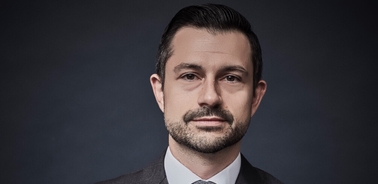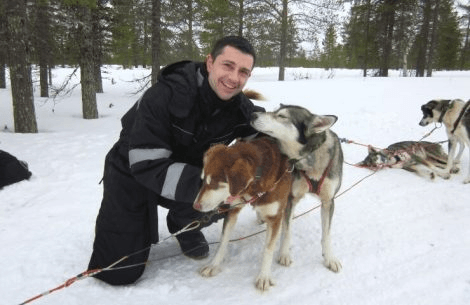- Home
- News And Events
- What’s Going On
- Faculty Spotlight: Daniel Blake
Faculty Spotlight: Daniel Blake

Meet one of IE Business School’s most influential thought leaders.
Students enjoy Strategy Professor Daniel Blake’s classes, earning him the Best Professor Award at the December 2021 graduation. The interdisciplinary scope of his IE Business School classes stitches together his background—which includes a doctoral degree in political science— and business issues and environment. Peer-reviewed journals such as American Journal of Political Science, International Organization, Strategic Management Journal and Strategy Science have published Blake’s research on topics such as political risk, foreign investment, and nonmarket strategy. His case-writing regularly receives accolades and his research has been funded by grants in the U.S., Spain and France.
Meet one of IE Business School’s top researchers.
What brought you to IE? Where were you before?
Before joining IE, I was a postdoctoral fellow at Princeton University’s Niehaus Center for Globalization and Governance. I had always been curious about working at a business school where I could focus my research on the activities of firms and help students prepare for leadership roles in business. So, when IE posted a job ad, I applied. At the time, I was particularly drawn to IE because of its pluralistic approach to research, friendly atmosphere and its international student body. And, of course, Madrid is an incredible place to live.
Have you ever had an a-ha moment while teaching that furthered your research? What was it?
Much of my research focuses on cross-national comparisons, and seeks to explain why firms and governments behave differently in different countries. So, there have been many occasions while teaching when students have offered perspectives from their home countries, or countries where they have worked, that has helped advance my thinking with respect to research.
What book do you wish your students would read before taking your class and why?
I would recommend books that help to break down or challenge common misperceptions or assumptions about how businesses and governments function and interact. With this in mind, I would recommend three books:
- 23 Things They Don’t Tell you about Capitalism, by Ha-Joon Chang
- The Dictator’s Handbook, by Bruce Bueno de Mesquita and Alastair Smith
- The Entrepreneurial State, by Mariana Mazzucato
These are all easy-to-read books but are written by scholars with a long track record of rigorous research. More importantly, they offer a counterweight to the conventional wisdom with respect to markets, governments and innovation.
Please name one of your articles or books you feel addresses the most important issues in 2022 for IE alumni?
With the world facing serious health, environmental and social challenges, there is growing pressure on governments to meet those challenges by changing the activities of firms through regulatory and legislative reform. Managers are operating in an environment of increasing political risks. So, I would highlight some of my work on the strategies that firms can develop to manage such risks and the limits of deploying such strategies. In particular, I have an article on strategic framing that is written for managers as well as a more academic piece on the potential operational costs of managing political change.
Whose research of your IE colleagues do you find interesting? Why?
I am fortunate to work alongside many accomplished scholars that have a long track record of studying interesting questions, particularly my colleagues in the strategy area such as Caterina Moschieri and Luis Diestre, and Rocio Bonet in human resource management. However, I would like to spotlight some of the exciting work being done by my colleagues that are on the tenure track. In particular, Ben Barber does great work on lobbying and has a long-standing interest in the political economy of cities and why they grow or decline, which is an important issue for firms and governments alike. I also find Martina Montauti’s research on the evolution of industry boundaries to be exciting because how we categorize dynamic markets, products and actors is an often challenging but necessary first step to any attempt at regulation.
Tell us one personal thing about yourself that none of your students know. A hobby, sport or talent? Strange fact? Unusual interest?
I had a very international upbringing. In addition to my home countries of Australia and Turkey, I had lived in Sweden, Pakistan, Sri Lanka, and Syria by the time I was 14. I think this experience has given me an international perspective that has spilled over into my work and also my personal interests. Take sport, for example. On the one hand, I’ve been an Atlético de Madrid socio for 10 years, and on the other I am passionate about test cricket that is played on the other side of the world. I’ve also become recently interested in the business of wine and the different traditions, methods and grape varieties found around the world. Whether it’s sport, wine or anything else, I’ve always been fascinated by how people do the same things differently around the world. Our differences are what makes us interesting, and learning about and experiencing those differences whether through travel, work or culture is an endless source of interest.
